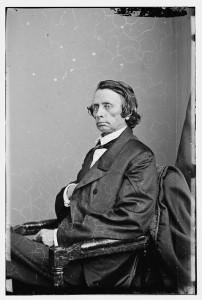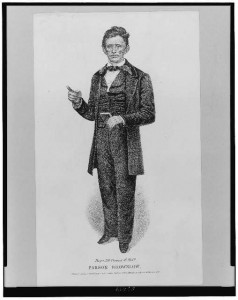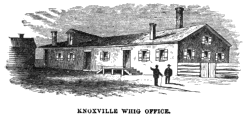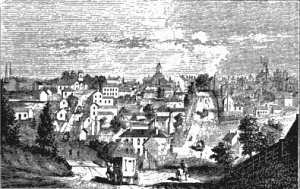We’ve seen evidence that the Lincoln administration has been shutting down opposition newspapers. 150 years ago today the news made it to Gotham that a similar event occurred in the Confederacy. Parson William Brownlow had announced he was suspending publication of the Knoxville Whig, the newspaper he edited, because he was probably going to be arrested and indicted by a Confederate court. Here’s a bit from The New-York Times November 8, 1861:
MISCELLANEOUS REBELLION NEWS.; A STURDY PATRIOT. PARSON BROWNLOW’S FAREWELL TO HIS READERS. From the Whig. SARCASTIC.
The Cincinnati Gazelle has received a copy of Parson BROWNLOW’s Knoxville Whig of Oct. 26, the last, that will be issued for — a few weeks only, let us hope. It contains the following
FAREWELL
From the Knoxville Whig. Oct. 26.
This issue of the Whig must necessarily be the last: for some time to come — I am unable to say how long, The Confederate authorities have determined upon my arrest, and I am to be indicted before the Grand Jury of the Confederate Court, which commercial [commenced?] its session at Nashville on Monday last. I would have awaited the indictment and arrest before announcing the remarkable event to the world, but as I only publish a weekly paper my hurried removal to Nashville would deprive me of the privilege of saying to my subscribers what is alike due to myself and them. I have the fact of my indictment, and consequent arrest having been agreed upon for this week from distinguished citizen, legislators and lawyers at Nashville, of both parties. Gentlemen of high positions, and members of the secession party, say that the indictment will be made because of some “treasonable articles in late numbers of the Whig.” I have reproduced those two “treasonable articles” on the first page of this issue, that the unbiased people of the country may “read, mark, learn and inwardly digest” the treason. They relate to the culpable remissness of these Knoxville leaders in falling to volunteer in the cause of the Confederacy. …
The real object of my arrest, and contemplated imprisonment is, to dry up, break down, silence and destroy, the last – and only Union paper left in the eleven seceded States, and thereby to keep from the people of East Tennessee the facts which are dally transpiring in country. After Hon. JEFF. DAVIS had stated in Richmond, in conversation relative to my paper, that he would not live in a Government that did not tolerate freedom of Press; after the judges, attorneys, jurors, and all of these position of honor and trust, under the “Permanent Constitution,” which guarantees FREEDOM OF THE PRESS; and after the entire Press of the South had come down in their thunder tones upon the federal Government for suppressing the Louisville Courier and the New-York Day Book, and other secession journals — I did expect the utmost liberty to be allowed to one small sheet, whose errors could be combatted by the entire Southern Press! It is not enough that my paper has been denied a circulation through the ordinary channels of conveyance in the country, but it must be discontinued altogether, or its editor must write and select only such articles as meet the approval of a pack of scoundrels in Knoxville, when their superiors in all the qualities that adorn human nature, are in the Penitentiary of our State! And this is the boasted liberty of the Press, in the Southern Confederacy! …
Exchanging, with proud satisfaction, the editorial chair and the sweet endearments of home for a cell in the prison, or the [???] of an exile, I have the honor to be, &c., WILLIAM G. BROWNLOW.
Editor of the Knoxville Whig.
Oct. 24 1851 [1861].
William Gannaway Brownlow, who “often boasted that he was “never neutral” on any issue” certainly had an interesting life and career. An antebellum preacher and newspaper publisher, Brownlow would become a politician after the Civil War ended.
Brownlow’s Whig was published under various names. Here’s Wikipedia’s summary of the Civil war years for Brownlow and his paper:
After Tennessee withdrew from the Union in June 1861, the Confederate Army occupied East Tennessee and arrested several noted Union supporters. Throughout the summer of that year, Brownlow dedicated much of the Whig to defending these Unionists. By October, the Whig was the last pro-Union newspaper in the Confederacy. Finally, on October 24, Brownlow announced he had become aware of an indictment issued against him and was suspending publication. The Confederate Army confiscated the Whig offices and used the printing machinery to convert muskets into rifles.
Brownlow was eventually arrested but released. He went into exile in the North, where he published a book and played an important role in rallying support for the liberation of East Tennessee. He returned to Knoxville on the heels of the Union general Ambrose Burnside’s invading army in September 1863, and revived the Whig under the title, Knoxville Whig, and Rebel Ventilator. Brownlow used the Whig to harass Knoxville’s Confederates, and had a number of them expelled. These included the Confederate diarist Ellen Renshaw House, who wrote that Brownlow was “the vilest thing that ever lived.”
Brownlow’s Sketches of the Rise, Progress, and Decline of Secession
was published in 1862.
Southern Unionists Chronicles has a bit about Brownlow in a post back in February.




